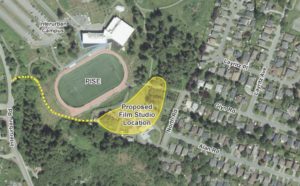The NDP government announced on Saturday, April 10 that it is going through with its promise of a $150,000 investment into a feasibility study for a potential film studio at Camosun College’s Interurban campus. While the studio is not confirmed yet, the study will take a look at potential opportunities for both education and employment that such a facility could provide, as well as investigating available land and the interest of people in the film industry. The government promised the funding during the 2020 election.
“I’ve been working very closely with the mayor of Saanich, with some of our members of the Legislative assembly, including [NDP Saanich MLA] Lana Popham and [NDP Oak Bay-Gordon Head MLA] Murray Rankin, who have shown a great deal of interest in the development of a studio here,” says Camosun vice president of partnerships Geoff Wilmshurst. “I’ve also been meeting with people in the film industry in British Columbia who have taken an interest in seeing the development of a film studio on Vancouver Island and are interested in the concept of having a college provide integrated training with a film studio.”

Wilmshurst—who adds that he’s met with members of the community about this and that the college takes its community involvement seriously—says a film studio could benefit both students and the college; he says that the film industry in BC brings in about $3.4 billion in annual revenue, and that in the past 12 months it has brought $50 million in revenue to southern Vancouver Island.
“I was particularly interested in the opportunity for education and training for Camosun students and for being able to provide education and training that will lead to very well-paying jobs and an opportunity for the college to really take a leadership role on Vancouver Island in terms of the training of people in the film industry.”
Rankin says that having a movie studio at Camosun would mean Victoria getting a lot of jobs that are currently going to the mainland.
“[Film]’s a multi-billion-dollar industry providing good jobs,” he says. “Vancouver, however, has taken the lion’s share of that work, and Victoria… has very little of that work. People have said, ‘Why?’ And the reason we don’t get it is simple—we don’t have a sound stage; we don’t have a facility in which we can film indoors. We’ve got beautiful locations and we’ve got skilled people but we just do not have a sound stage in which you can do indoor scenes. And that makes work for carpenters and that makes work for others, and then you can do full-length productions, feature films, TV productions, and the like. So that is what people have long said was the missing ingredient and why we’re not getting our share of the work that is going primarily to Vancouver.”
Rankin—who says Victoria is set up well for filming, with an international airport and lots of hotels in the region, as well as federal and provincial tax credits that make it attractive for people to come film here—says the studio and the programs that the college would hold there would be used by those with a variety of skills, from acting to trades.
“You’ve got the best carpentry program in British Columbia at Interurban. Well, a sound stage is all about carpentry, it’s all about designing sets,” he says. “It’s about very skilled work like that to create just the right set. Culinary Arts, well, catering is a huge part of any film production. Key grips, animation, maybe new courses, maybe a course in the English department to do screenplay writing. All of this is possible. Imagine as a student, if you have a world-class production happening at Camosun College, imagine learning from the best, from people who are in the industry, making films right here. Think of all the possibilities that can create for learning and for future employment, for people who might be interested in the film industry.”
Rankin has met with Camosun president Sherri Bell and Saanich mayor Fred Haynes to talk about the studio. (The province has also committed just under $2 million to create a new road off Interurban Road to deal with increased traffic as a result of the studio.)
“Everybody’s united on this,” says Rankin. “There’s usually some bad-news part of the story, but this is all so great… The missing ingredient is the film stage, the sound studio. That is what we need and that is what I hope will come out of this process, if somebody steps forward and says, as we expect they will, ‘What an opportunity.’”
Wilmshurst says that he hopes that in the long term, the studio will provide a lot of chances for Camosun students to learn and for Camosun grads to work.
“Our hope is that in five years time we’ll have a working studio with a number of sound stages that would see a tremendous number of opportunities for jobs for Camosun graduates, that we would have a whole suite of education programs that Camosun students would be able to access in order to get really well-paid jobs in the film industry,” he says.
